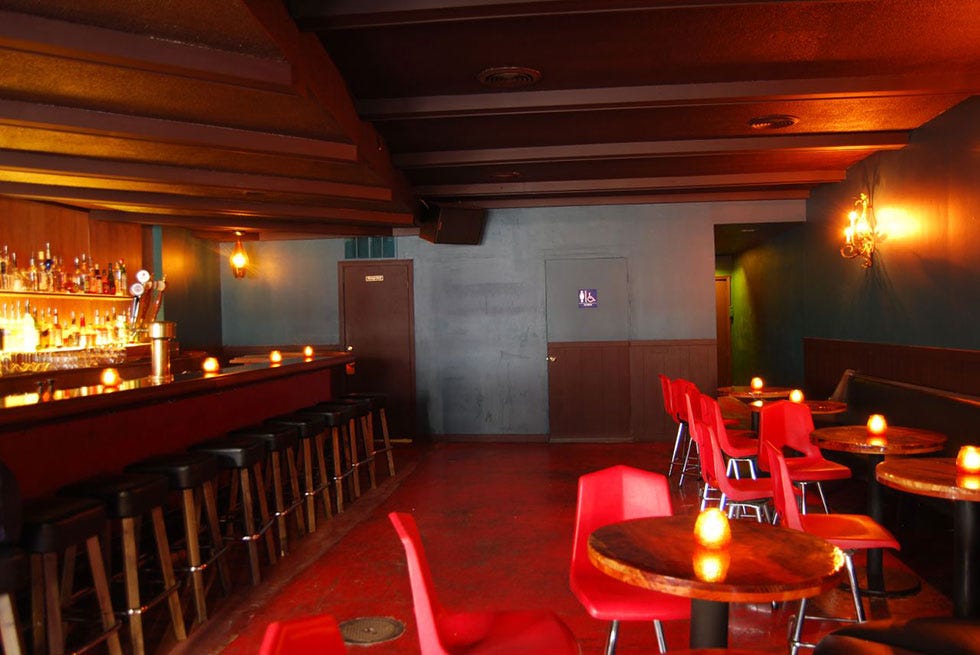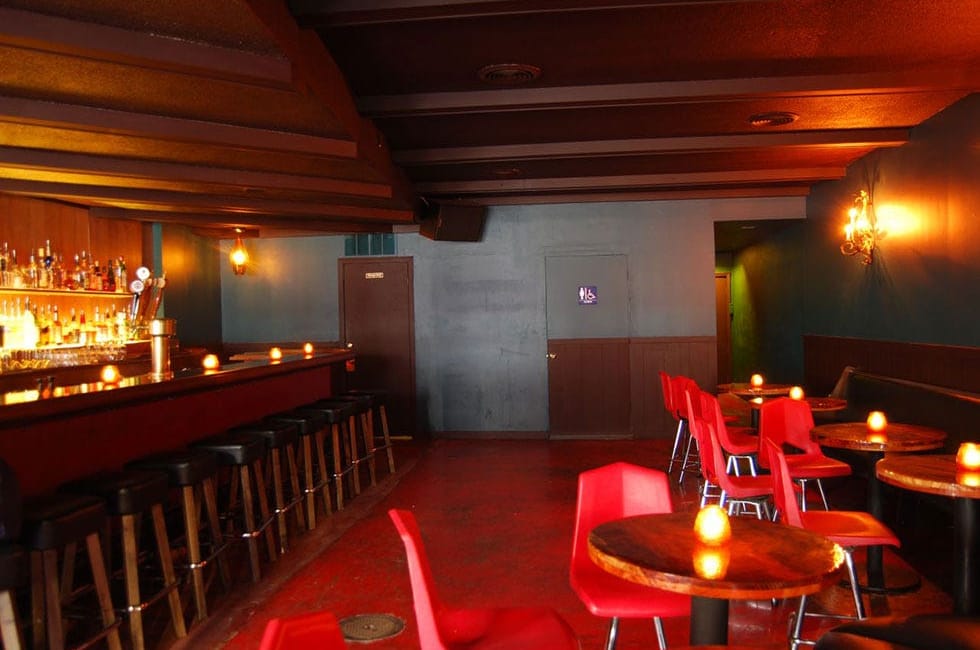By Jeremy Lybarger

Last week, 7x7 published an article with the provocative headline “Is the San Francisco Dive Bar Dead?” The occasion for the piece was the recent announcement that Lucky 13 could close to make way for swanky condos, the latest in a string of casualties that includes Esta Noche, The Attic, Nite Cap, the Lexington Club, Marlena’s, 21 Club, Kimo’s, and more.
Despite its alarmist thinkpiece headline, 7x7’s article was really a kind of citywide ultimatum: Everyone better start getting along or more dive bars will hit the chopping block. Sarah Lee, the article’s author, proposed a truce between what she characterized as wary dive bar regulars and their condescending (techie) interlopers. She added, “Unless you were born upstairs in the office, you have no birthright to this bar — you were once a newcomer as well.”
What’s interesting is the implicit analogy to the native San Franciscan vs. transplant narrative that underlies so many debates about the city. If you were born here, the argument goes, you have a greater territorial stake in the city’s future. That analogy rings false to me. After all, native San Franciscans were born here randomly and arbitrarily, while longtime bar patrons are likely there because they choose to be, usually because the bar offers a sense of kinship and community. A dive bar isn’t a microcosm of the city; it’s a specific place with specific people and traditions, an unique ecosystem with its own strata of history.
Something about the article’s tone bothered me, but I wasn’t able to suss out exactly what. Every few months local websites remember that San Francisco isn’t just a Shangri-La of handcrafted cocktails and dutifully roll out their list of the city’s best dives (SF Weekly, SFist, Thrillist, KQED, SFGate). Still, you know things are dire when a luxury lifestyle brand such as 7x7 runs a sentence like this: “But in truth, nothing beats the joy of sliding onto my favorite, cracked bar stool, waving to the bartender who knows my name, and knowing that my drink options are limited to domestic beer, a two-ingredient mixed drink, and/or a shot of fernet.”
My problem with the article — and arguments that echo it — is how it reduces the dive bar scrimmage to a matter of etiquette. “The next time some rando in a suit is sitting on your favorite stool, don’t spend the next hour sharing rage-filled looks with the bartender,” Lee writes. “Instead, buy Mr. Suit a drink and ask what he thinks of the place. It may well be the money in his pockets that helps keeps your beloved bar alive.” And to those “randos” jonesing for a thrill in the Tenderloin, she offers this advice: “Just take a deep breath and respectfully observe. Don’t throw a fit if they don’t carry your precious bourbon … keep an open mind, chat up the bartenders and the owners, and if you have fun (you know you will), go back and show your support to these local businesses when it counts.”
A couple of things: First, people who would hypothetically “throw a fit” about the unavailability of “precious bourbon” probably don’t belong in a dive bar anyway. Second, that Lee has to remind readers to respectfully observe (italics hers) speaks volumes about the likely irreconcilable gulf between bar regulars and the bar crashers who see them as anthropological specimens or human jukeboxes spinning lurid oldies. Third, that she counsels Mr. Suit to support local businesses “when it counts” is akin to visiting a relative only when they’re dying. Thanks for the memories, bud.
It’s unrealistic to imagine dive bars and young, comparatively privileged customers like me ever achieving a genuine Kumbaya moment. Part of the reason why has to do with age and part has to do with mercy, the naked feeling of forgiveness that comes from revealing yourself among your own kind.
I should acknowledge here that I patronize dive bars semi-regularly (almost always in the Tenderloin, the neighborhood where I live). Whenever I’m in Aunt Charlie’s or 21 Club or Jonell’s, I’m aware of my “outsider” status as a young, educated, more or less economically stable white male. That doesn’t mean I feel unwelcome in those places, just that my perspective is probably different than that of the person on the stool next to mine. I don’t go to dive bars because of any particular aesthetic or ideological reason, and certainly not because I want to “slum” for the evening. It’s more a matter of temperament. I recognize in the regulars around me some of my own loneliness or sadness or jagged humor. As Colby Buzzell wrote about the drinkers in 21 Club, they sit by themselves “waiting for death.” And what’s a night out without patience for self-destruction?
Entering certain dive bars is like riding a bathysphere to the city’s subterranean depths. There’ve been nights when I’ve listened to an SRO tenant describe the cockroaches infesting her mattress; when I’ve listened to a drag queen describe the Compton’s Cafeteria riot in exquisite Technicolor detail; when I’ve listened to stories of bathhouse orgies; when I’ve listened to stories of blood parties and scat parties and bug chasing; when I’ve listened to stories of murder; when I’ve listened to a sex worker describe the bullet still pinballing around her brain. I’ve attended a wake in a dive bar; I’ve attended a wedding. I’m all for projects like Del Seymour’s, which seek a rapprochement between tech workers and the Tenderloin, but I’m also skeptical of them. It’s unrealistic to imagine dive bars and young, comparatively privileged customers like me ever achieving a genuine Kumbaya moment. Part of the reason why has to do with age, I think, and part has to do with mercy, the naked feeling of forgiveness that comes from revealing yourself among your own kind. It reminds me of a line from Denis Johnson’s book Jesus’s Son: “Sometimes what I wouldn’t give to have us sitting in a bar again at 9:00 a.m. telling lies to one another, far from God.”
I’m not the first to bemoan the — for lack of a better word — secularization of SF’s dive bars. Earlier this month, Broke-Ass Stuart penned an impassioned rant against cocktail bars for the Examiner: “The great American dive bar is being threatened in its natural habitat, and unless we do something the last one will be put on display in Golden Gate Park next to the buffaloes.” For writers like Sarah Lee, the answer is clearly a kind of détente between dive bars and the techies/hipsters/fratbros/suits who would claim them as their own. This sounds lovely in theory, but in practice it almost always means the whitewashing of the bar’s spirit. If the choice is between a bar closing for good or taking dollars from people like me to survive, the latter is the lesser of two evils, but it’s a Faustian bargain. Any way you cut it, the soul of the place is as good as dead.
Photo courtesy of Jennifer Yin/Flickr
Got a tip for The Bold Italic? Email tips@thebolditalic.com.







